Summary
Top 11 alternatives to Vonage: comparison table
| Software | Advantages | Disadvantages | Prices |
|---|---|---|---|
| 1. Ringover | Unlimited calling to 110+ destinations | Less practical for entrepreneurs | Plans start at $21 per user/month |
| 2. CloudTalk | Positive user experience | Lacking in technical support | Prices start at $30 per user/month |
| 3. RingCentral | Relatively extensive selection of integrations | Difficult to configure and onboard | Subscriptions begin at $30 per user/month |
| 4. 3CX | There's a free plan available with limited functionalities | 3CX doesn't provide the actual telephone service, just a software to manage it | Their pricing structure is unusual; plans begin at $135 per year |
| 5. Mitel | Specialized in hardware | Limited features available | Price on request only |
| 6. Dialpad | Intuitive interface | Unexpected costs can drive up the bill | Plans begin at $23 per user/month |
| 7. JustCall | Many integrations available | Outbound calls can increase your bill | You can subscribe starting at $20 per user/month |
| 8. Five9 | Omnichannel communications are available | Limited analytics can prevent proper analysis | Subscriptions start at about $150 per month |
| 9. Ooma | Software created to serve the needs of smaller businesses | The service can drop unexpectedly | Plans begin at $20 per user/month |
| 10. Nextiva | The VoIP phone comes with the customer experience platform | Complicated pricing plans | Costs change depending on the number of users |
| 11. Zoom Phone | Created to serve the needs of small businesses | If you're making many calls, there's is a risk of poor service | Subscription plans begin at $20 per user/month |
Why look for an alternative to Vonage?
The business telephony market is very competitive. When choosing a provider, consider these key criteria:
You need transparency
Vonage offers multiple product variations (APIs, UCaaS, contact center), but pricing transparency can be an issue. For example, Vonage does not publicly display pricing for its Contact Center service, requiring engagement with a sales representative. Many paid add-ons can increase costs. For clearer pricing and fewer surprise charges, consider vendors that include core functionalities by default.
You need a powerful solution
Vonage Business Communications is suitable for many businesses, but its basic plan lacks some essential features (e.g., call recording, IVR). Some alternatives include these features in lower-tier plans.
You need great technical support
Vonage has a long history in telecom, but user reviews sometimes criticize its technical support. If you need accessible, attentive support, consider providers that advertise dedicated contacts and responsive support tiers.
Top 11 Best Alternatives to Vonage (detailed)
1. Ringover
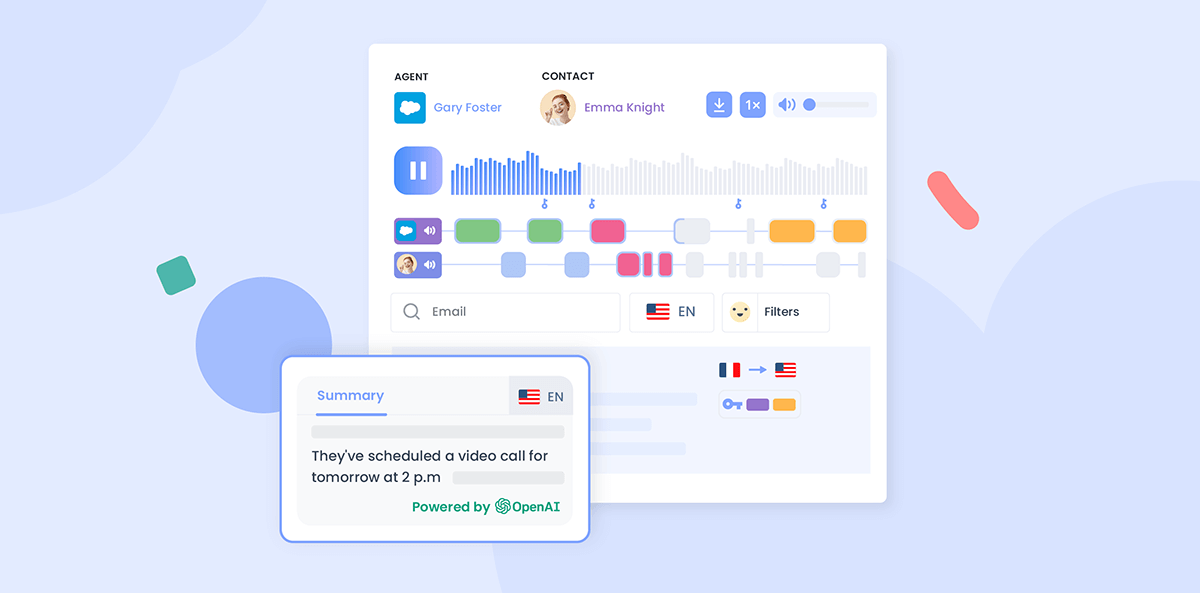
Ringover emphasizes simple deployment and ease of use—no special technical knowledge required. Its basic offering includes video conferencing, unlimited calls to 110 destinations, customizable phone greetings, and CRM integrations (Zendesk, Salesforce, HubSpot, etc.). It also provides comprehensive analytics for team and individual performance.
Video: Discover Ringover
Pros ➕
- Unlimited calls to over 110 destinations
- Very easy deployment solution
- Free trial available
- Omnichannel contact center solution
Cons ➖
- May not be ideal for entrepreneurs looking for very lightweight or budget options
Note: Ringover offers a free trial to test core features.
2. Cloudtalk

Cloudtalk is a cloud-based contact center solution that focuses on enhancing customer communication and improving agent productivity. It offers features such as call routing, IVR, call recording, and real-time analytics to help businesses optimize their customer service operations.
Pros ➕
- Metrics shown in a straightforward dashboard
Cons ➖
- International calling is very costly
- Too many features detract from the user experience
- Difficult to collaborate with team members
3. RingCentral
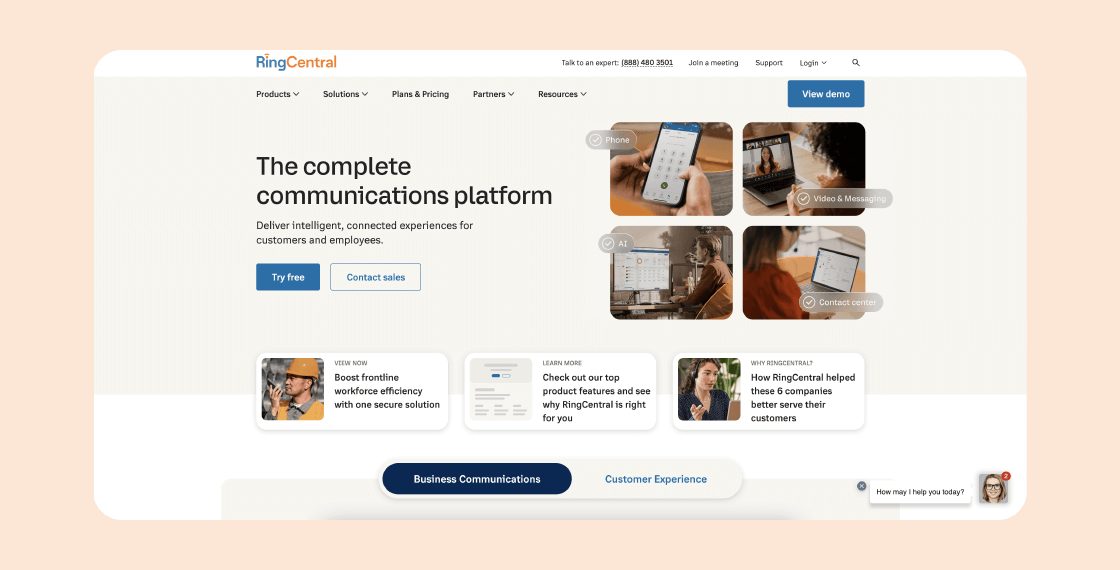
RingCentral is a long-standing enterprise telecom provider with multiple plans for SMBs and enterprises. Some features are restricted by plan level, so accessing advanced features may require upgrading.
Pros ➕
- Can be used across devices
Cons ➖
- Affordable plans lack key features
4. 3CX
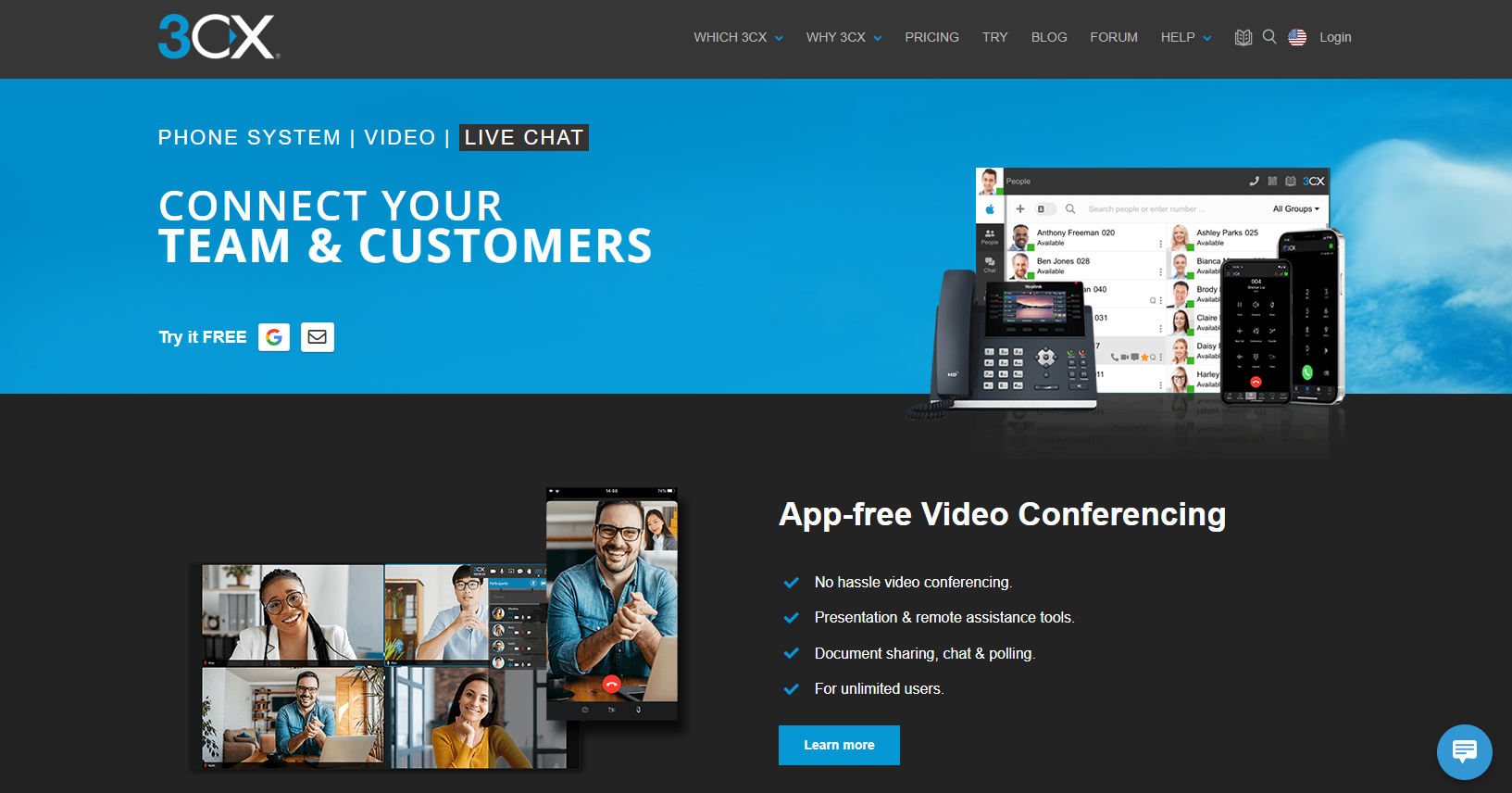
3CX provides software-based PBX functionality (video/web conferencing, messaging, mobile apps) but is not a telephone operator. You must obtain telephone service separately and purchase through distributors, which can lead to variable pricing.
Pros ➕
- Free version available
Cons ➖
- Lack of transparency in final pricing due to exclusive sales through partners
- No telephone service provided, just a software with telephony features
- Dated interface
- Inflexible solution
5. Mitel
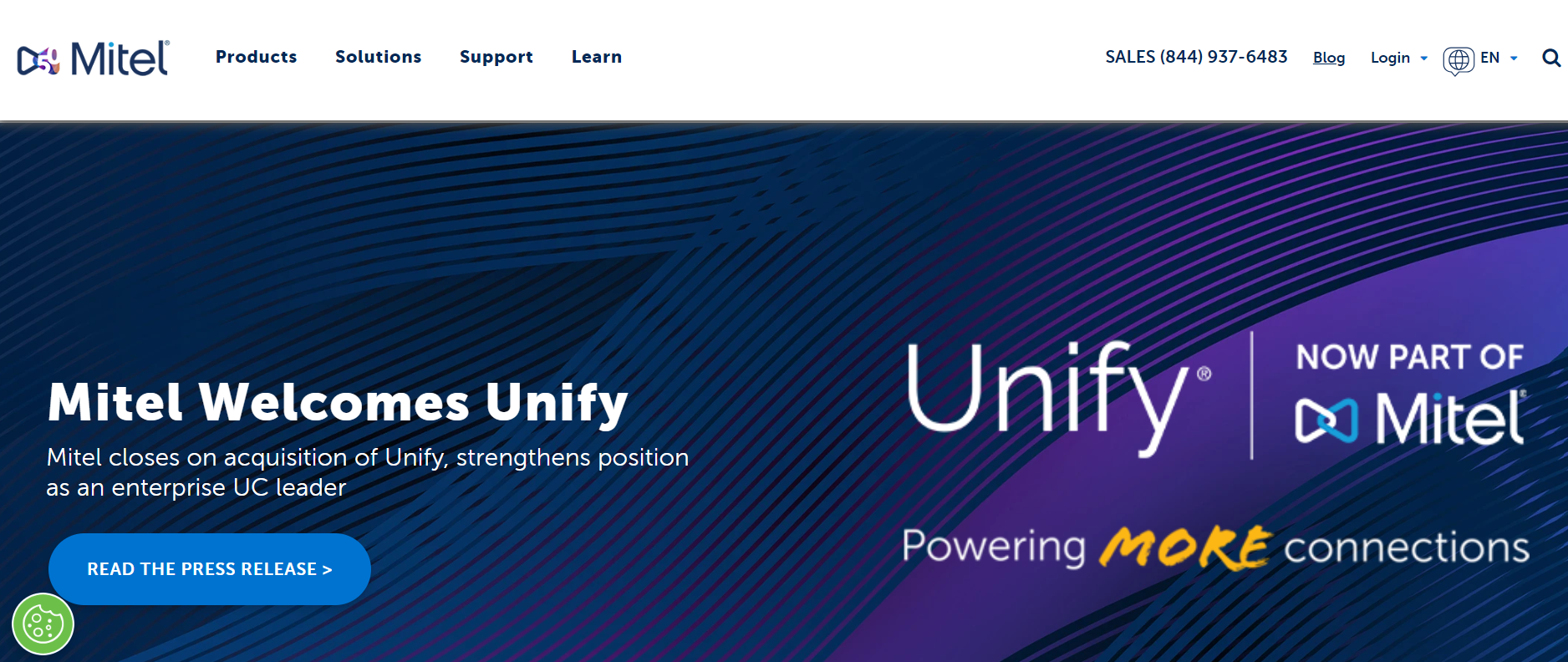
Mitel offers cloud telephony, collaboration tools, and contact center solutions. It has historical strength in hardware telephony and now focuses on software for omnichannel communication management.
Pros ➕
- Specialist in professional hardware telephony
Cons ➖
- Lack of clarity on pricing
- No trial version
6. Dialpad
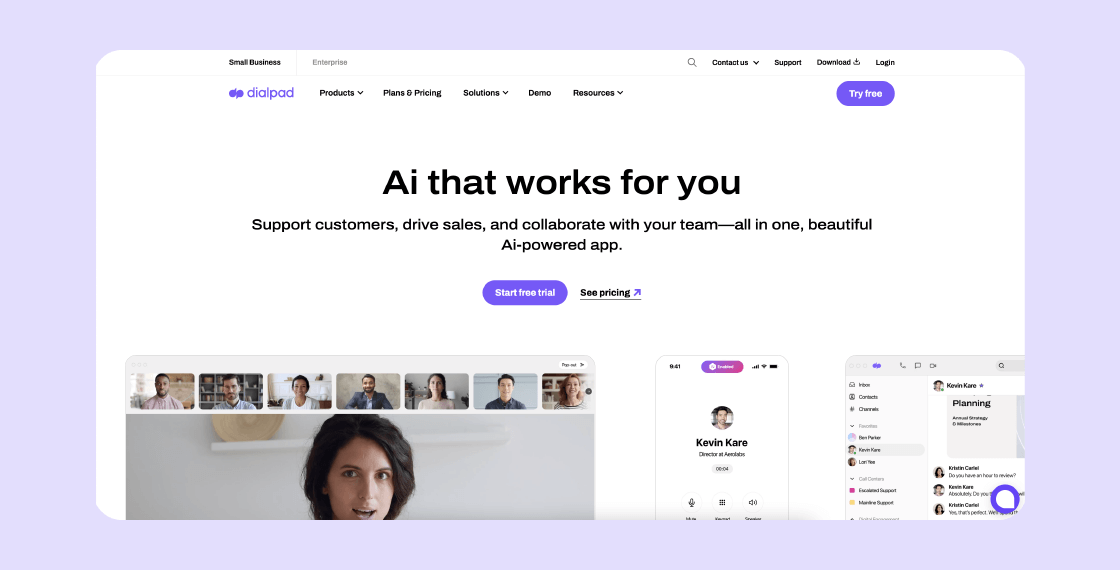
Dialpad integrates AI into its communications platform (automatic call transcriptions, sentiment analysis) and offers audio calling and messaging.
Pros ➕
- Offers a free trial for a limited time
Cons ➖
- Call quality issues have plagued users
- Pricing rates are relatively high
- Customer support can be slow to respond
7. JustCall
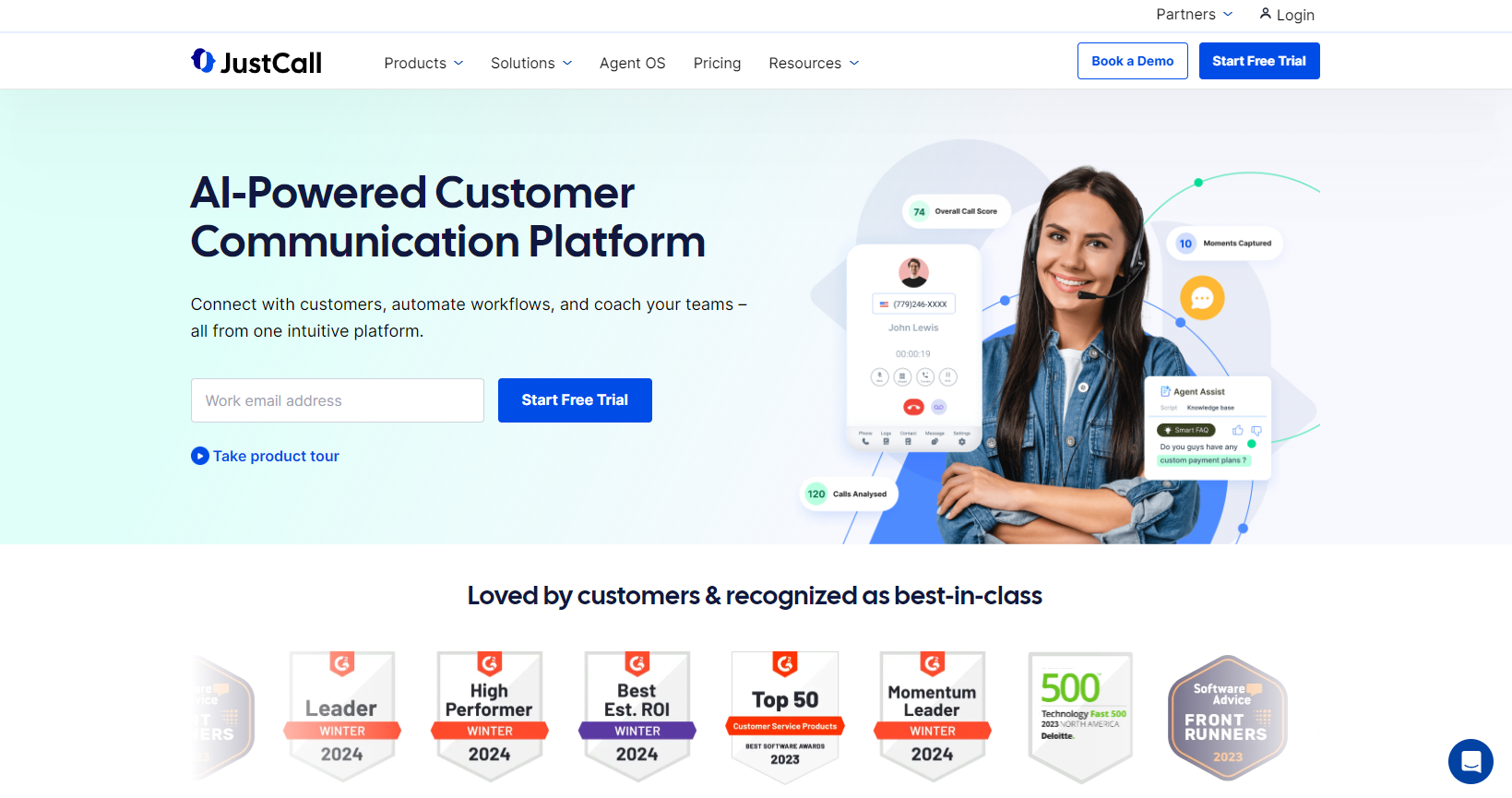
JustCall offers business communications and AI features, and supports outbound call centers with domestic and international calling capabilities.
Pros ➕
- Easy set up
Cons ➖
- Pricing can be complicated, especially if you need sentiment analysis
- Calls can randomly drop
- Users have reported problems with call logs and call routing
8. Five9

Five9 is a mature CCaaS provider offering inbound and outbound contact center software with extensive reporting and tools.
Pros ➕
- Many reporting tools available
Cons ➖
- Forced logouts or expired sessions interrupt users inconveniently
- The phone service itself can fail or be compromised
- No free trial available
9. Ooma

Originally consumer-focused, Ooma developed Ooma Office for small and medium businesses. It can be cost-effective compared to landlines but may be limited for larger needs.
Pros ➕
- Potential cost savings compared to a landline-based phone system
Cons ➖
- Ooma Office isn't widely available
- Complicated set up
- Some features like call logging aren't easy to understand and use
10. Nextiva

Nextiva offers a variety of products, including business communications and contact center software. Some features are locked behind higher-priced plans.
Pros ➕
- Manage customer relationships efficiently
Cons ➖
- Not suited for non-enterprise level businesses
- Difficult to access certain phone features because they're locked behind expensive plans
- If you opt for Nextiva hardware, the quality may be low
11. Zoom Phone
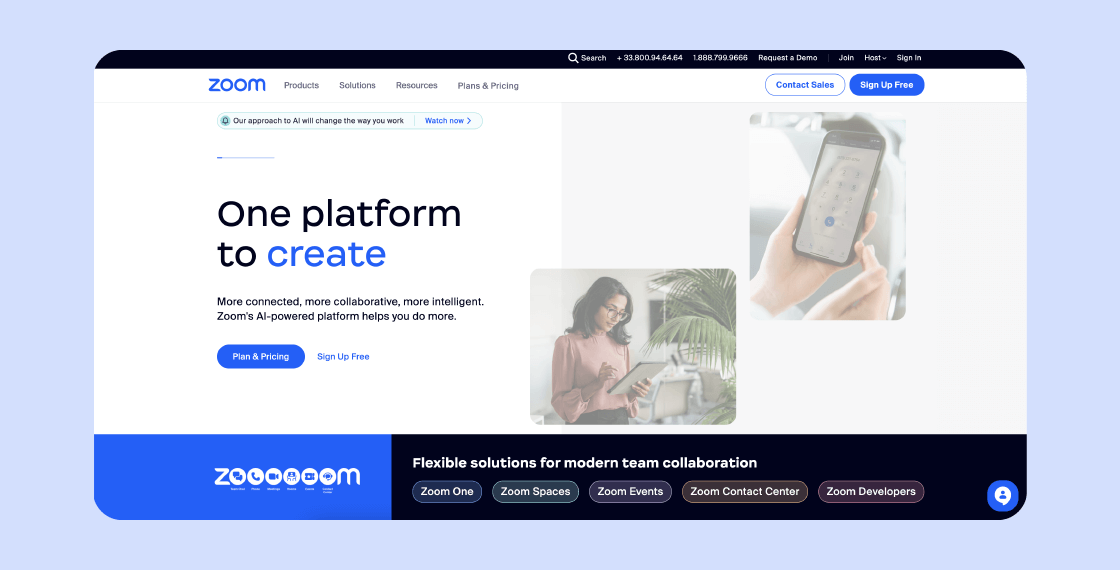
Zoom Phone integrates with Zoom’s videoconference product but has more limited telephony features (e.g., lacks international phone numbers and SMS in some cases). Outbound calls can be charged per minute.
Pros ➕
- Easily pairs with Zoom's videoconference product
Cons ➖
- Bill can be unpredictable due to how outbound calls are charged
- Extremely limited features
- Difficult to manage call flow via call routing
What is the best Vonage alternative?
According to the criteria of transparency, feature set, and support, Ringover is presented as a top alternative to Vonage. Ringover is described as a powerful cloud communication solution with clear pricing and features such as HD calls, unlimited calling to many destinations, IVR, call recording, and analytics. A free trial is available to evaluate the platform.
Vonage Alternatives FAQ
How does Vonage work?
Vonage provides APIs, unified communications (Business Communications), omnichannel contact center solutions, and conversational AI tools. Its contact center and business communications products operate over the internet using Voice over IP (VoIP), converting voice signals into data packets so calls can be made from computers or mobile devices. Depending on the subscription, additional features may include call/voicemail transcription, omnichannel tools, and performance analytics. Many features can be used directly in a web browser.
What are the prices offered by Vonage?
Vonage Business Communications is listed in three plans: Mobile ($19.99), Premium ($29.99), and Advanced ($39.99). European pricing is not always shown, and discounts may be possible for additional lines. Many add-ons can increase costs. Vonage Contact Center offers four plans (Express, Essentials, Select, Premium), but Vonage does not make pricing for these plans publicly available.
Who are the main competitors of Vonage?
There are many competitors worldwide. Eleven notable alternatives include Ringover, CloudTalk, RingCentral, 3CX, Mitel, Dialpad, JustCall, Five9, Ooma, Nextiva, and Zoom Phone.
Bibliography
- https://www.forbes.com/advisor/business/software/zoom-phone-review/
- https://www.five9.com/products/pricing
- https://www.vonage.com/unified-communications/pricing/
- https://www.trustradius.com/products/ooma-office/reviews?
- https://www.nextiva.com/nextiva-pricing.html?v=1
Published on January 16, 2024.

